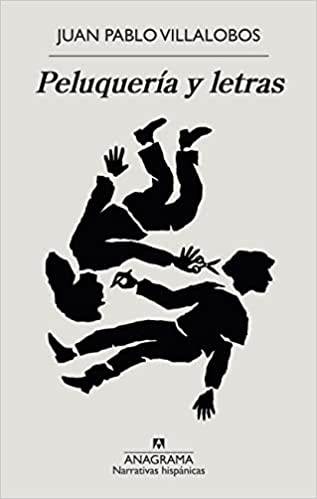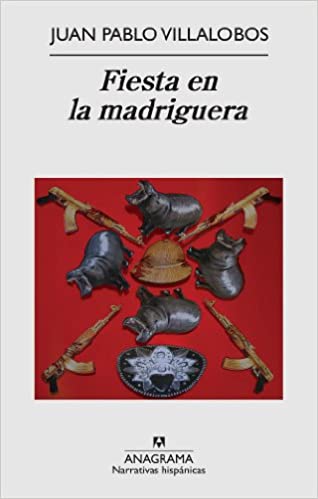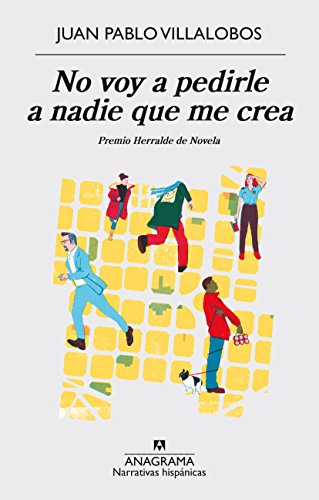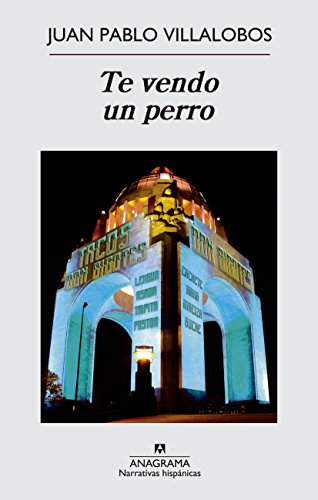Creative ingenuity is demonstrated to a greater extent in integration, in the ability to melt a plot in a crucible with the maximum of resources towards the greatest number of emotions. and in that John Paul Villalobos leads many other contemporary storytellers.
Because this Mexican writer pulls different tools on each occasion without neglecting any, from the humor to the tension of suspense, through a particularly pampered psychological burden of its characters and an action that becomes surprising from the strange. All of this with the appropriate gear to always place the reader in the hurricane of his ideas and intentions rushing over our consciousness.
Yes, sometimes writing novels is something else. Because once the usual structures have been known and the possibilities explored at the mercy of that undeniable genius, new paths remain clear whereby readers can walk dazzled by the new footpaths ...
Top 3 recommended novels by Juan Pablo Villalobos
barbershop and lettering
Great stories despise humor. There is no room for laughter in the immortal gesture of the hero. Similar usually occurs in the romantic or in any other genre. Thank God, at some point the absurd took care of unloading that imperturbable spirit of heroes or lovers to offer us more referents to walk around the house. Because by now we all know that a hero is one who does what he can, even more so in the titanic mission of pursuing happiness.
This could be a picaresque novel, although, according to the receptionists at the gastroenterology clinic where the protagonist is undergoing a colonoscopy, it could very well be a crime novel, with intricate mysteries, macabre accidents, incriminating evidence and two unusual suspects: a Breton hairdresser with a dark past and a supermarket watchman obsessed with writing the testimony of his experiences in life. The worst thing is that the protagonist doesn't even imagine it, because he is too worried about the consequences of happiness, that intoxicating torpor so pleasant that it makes him fear that he has fallen into the trap of gentrification.
It is often repeated that there is no literature after a happy ending, that "good literature" is not a happy literature. Happiness is banal, superficial, frivolous, without conflict. And without conflict, it is said, there is no literature. Is it really impossible to write a happy novel about happiness? A novel that is profound and at the same time frivolous, transcendental and banal, a joyous story that is not pure selfish evasion? The protagonist of this story is not sure and tries to find out with the help of his family; As for the author of these pages, we suspect that he needs to believe so.
Party At The Burrow
The crib writer who also has the will and self-demand ends up giving birth to a great novel the first time, surprising locals and strangers, keeping that veiled smile of self-sufficiency in the spotlight. A smile supported by the assurance that he can do it again, since he is already an alchemist with a clear method of letters.
Tochtli likes hats, dictionaries, samurai, guillotines, and the French. But Tochtli is a boy and now what he wants is a new animal for his private zoo: a pygmy hippo from Liberia. His father, Yolcaut, a drug trafficker at the peak of power, is ready to fulfill his every whim. It does not matter that it is an exotic animal in danger of extinction. Because Yolcaut can always.
Tochtli lives in a palace. A gold-covered burrow where he lives with thirteen or perhaps fourteen people: thugs, prostitutes, dealers, servants and a corrupt politician. And then there is Mazatzin, his private teacher, for whom the world is a place full of injustices where the imperialists are to blame for everything.
Party in the Burrow is the chronicle of a delirious journey to fulfill a whim. Severed heads, rivers of blood, human remains, mountains of corpses. The burrow is in Mexico and it is already known: Mexico is sometimes a magnificent country and sometimes it is a disastrous country. Things are like this. Life, after all, is a game and a party.
I'm not going to ask anyone to believe me
At the end of the absurd experience you may consider that kind of explanation so as not to ask anyone to believe you after the imperative need to tell it. But it is that the protagonists of Villalobos always need the pertinent explanations that give way to understand the ultimate argument of life ...
It all begins with a cousin who, as a boy, pointed out ways of being a con man, and who now gets the protagonist a Mexican who travels to Barcelona accompanied by his girlfriend to study literature, and who also calls himself after the author of the novel in a monumental mess: a "high-level business" that turns his stay in the city into a kind of black novel with black humor, one of those he would like to write.
Through these pages parade a diverse fauna of priceless characters: extremely dangerous gangsters the lawyer, Chucky, the Chinese; a girlfriend named Valentina who reads Wild Detectives and is on the verge of destitution and doesn't know anything about it; a girl named Laia whose father is a corrupt politician from a right-wing nationalist party; an Italian squatter who has lost his dog; a Pakistani who pretends to sell beer so as not to arouse suspicion… And to complicate everything a little more, a second Laia appears, who is mossa mad and redhead; a dog named Viridiana; a girl who recites verses by Alejandra Pizarnik and even the protagonist's own mother, melodramatic, proud and blackmailing like in a good Mexican soap opera.
Other recommended novels by Juan Pablo Villalobos
I sell you a dog
In a dilapidated building in Mexico City, a group of elderly people spend their days amid neighborhood squabbles and literary gatherings. Teo, the narrator and protagonist of this story, is seventy-eight years old and has a sick attachment to Adorno's aesthetic theory, with which he solves all kinds of domestic problems.
Retired taquero, frustrated painter with pedigree, his main concerns are keeping track of the drinks he drinks per day to maximize his dwindling savings, writing something that is not a novel in a notebook, and calculating the chances he has of taking home. bed to Francesca - president of the neighborhood assembly - or to Juliette - revolutionary greengrocer - with whom she constitutes a sexual triangle of the third age that "would have raised Freud's beard himself."
The routine life of the building is broken by the irruption of youth, embodied in Willem - a Mormon from Utah -, Mao - a clandestine Maoist - and Dorotea - the sweet Cervantine heroine, Juliette's granddaughter -, in a crescendo of absurdities that reaches a climax to wet pants. Conceived under the dictation of Adorno, who affirms that "advanced art writes the comedy of the tragic", intertwining fragments of the past and the present, this novel covers the art and politics of Mexico in the last eighty years, marked in history familiar by the succession of dogs of the protagonist's mother, in an attempt to vindicate the forgotten, the cursed, the marginalized, the disappeared and the stray dogs.




